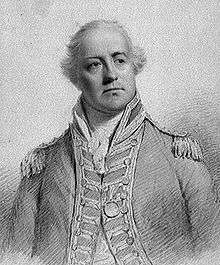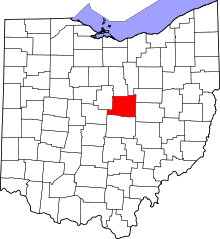Gambier, Ohio
| Gambier, Ohio | |
|---|---|
| Village | |
|
Middle Path | |
 Location of Gambier, Ohio | |
 Location of Gambier in Knox County | |
| Coordinates: 40°22′35″N 82°23′48″W / 40.37639°N 82.39667°WCoordinates: 40°22′35″N 82°23′48″W / 40.37639°N 82.39667°W | |
| Country | United States |
| State | Ohio |
| County | Knox |
| Government | |
| • Mayor | Kachen Kimmell |
| Area[1] | |
| • Total | 0.94 sq mi (2.43 km2) |
| • Land | 0.94 sq mi (2.43 km2) |
| • Water | 0 sq mi (0 km2) |
| Elevation[2] | 1,079 ft (329 m) |
| Population (2010)[3] | |
| • Total | 2,391 |
| • Estimate (2012[4]) | 2,408 |
| • Density | 2,543.6/sq mi (982.1/km2) |
| Time zone | Eastern (EST) (UTC-5) |
| • Summer (DST) | EDT (UTC-4) |
| ZIP code | 43022 |
| Area code(s) | 740 |
| FIPS code | 39-29246[5] |
| GNIS feature ID | 1056293[2] |
| Website | http://www.villageofgambier.org/ |

Gambier is a village in Knox County, Ohio, United States. The population was 2,391 at the 2010 census.
Gambier is the home of Kenyon College. A major feature is a gravel path running the length of the village, fondly referred to as "Middle Path". This path has become a piece of Gambier's history, as it is used by college students and residents alike as a way through the community.
History
Gambier was laid out in 1824.[6] The village was named after one of Kenyon College's early benefactors, Lord Gambier.[7][8]
Geography
Gambier is located at 40°22′35″N 82°23′48″W / 40.37639°N 82.39667°W (40.376400, -82.396570),[9] along the Kokosing River.
According to the United States Census Bureau, the village has a total area of 0.94 square miles (2.43 km2), all land.[1]
Demographics
| Historical population | |||
|---|---|---|---|
| Census | Pop. | %± | |
| 1850 | 280 | — | |
| 1860 | 575 | 105.4% | |
| 1870 | 581 | 1.0% | |
| 1880 | 576 | −0.9% | |
| 1890 | 660 | 14.6% | |
| 1900 | 751 | 13.8% | |
| 1910 | 537 | −28.5% | |
| 1920 | 433 | −19.4% | |
| 1930 | 498 | 15.0% | |
| 1940 | 470 | −5.6% | |
| 1950 | 1,037 | 120.6% | |
| 1960 | 1,148 | 10.7% | |
| 1970 | 1,571 | 36.8% | |
| 1980 | 2,056 | 30.9% | |
| 1990 | 2,073 | 0.8% | |
| 2000 | 1,871 | −9.7% | |
| 2010 | 2,391 | 27.8% | |
| Est. 2015 | 2,437 | [10] | 1.9% |
2010 census
As of the census[3] of 2010, there were 2,391 people, 343 households, and 126 families residing in the village. The population density was 2,543.6 inhabitants per square mile (982.1/km2). There were 375 housing units at an average density of 398.9 per square mile (154.0/km2). The racial makeup of the village was 90.5% White, 2.8% African American, 0.2% Native American, 2.0% Asian, 0.8% from other races, and 3.7% from two or more races. Hispanic or Latino of any race were 2.8% of the population.
There were 343 households of which 15.2% had children under the age of 18 living with them, 30.6% were married couples living together, 4.7% had a female householder with no husband present, 1.5% had a male householder with no wife present, and 63.3% were non-families. 33.5% of all households were made up of individuals and 11.4% had someone living alone who was 65 years of age or older. The average household size was 2.39 and the average family size was 2.76.
The median age in the village was 21.2 years. 4% of residents were under the age of 18; 79.6% were between the ages of 18 and 24; 5.1% were from 25 to 44; 6.7% were from 45 to 64; and 4.5% were 65 years of age or older. The gender makeup of the village was 47.3% male and 52.7% female.
2000 census
As of the census[5] of 2000, there were 1,871 people, 278 households, and 142 families residing in the village. The population density was 1,998.5 people per square mile (768.5/km²). There were 305 housing units at an average density of 325.8 per square mile (125.3/km²). The racial makeup of the village was 94.07% White, 2.51% African American, 1.28% Asian, 0.05% Pacific Islander, 0.43% from other races, and 1.66% from two or more races. Hispanic or Latino of any race were 1.66% of the population.

There were 278 households out of which 22.3% had children under the age of 18 living with them, 43.9% were married couples living together, 6.5% had a female householder with no husband present, and 48.9% were non-families. 39.9% of all households were made up of individuals and 12.2% had someone living alone who was 65 years of age or older. The average household size was 2.03 and the average family size was 2.77.
In the village the population was spread out with 5.8% under the age of 18, 73.1% from 18 to 24, 7.3% from 25 to 44, 9.0% from 45 to 64, and 4.9% who were 65 years of age or older. The median age was 21 years. For every 100 females there were 82.7 males. For every 100 females age 18 and over, there were 81.6 males.
The median income for a household in the village was $51,964, and the median income for a family was $71,477. Males had a median income of $40,500 versus $29,327 for females. The per capita income for the village was $9,661. About 2.5% of families and 8.0% of the population were below the poverty line, including 5.2% of those under age 18 and 2.6% of those age 65 or over.
Notable people
- Philander Chase, founder of Kenyon CollegeBishop of Ohio and Illinois, Sixth Presiding Bishop of the National Episcopal church
- Bayrd T. De Mallie , III -Vice President Financial Advisor graduated Kenyon Morgan Stanley
- Joan Slonczewski - biologist at Kenyon College
- P. F. Kluge - author of Biggest Elvis: A Novel
- Robie Macauley - newspaperman and author
- Herbert T. Perrin - U.S. Army officer
References
- 1 2 "US Gazetteer files 2010". United States Census Bureau. Retrieved 2013-01-06.
- 1 2 "US Board on Geographic Names". United States Geological Survey. 2007-10-25. Retrieved 2008-01-31.
- 1 2 "American FactFinder". United States Census Bureau. Retrieved 2013-01-06.
- ↑ "Population Estimates". United States Census Bureau. Retrieved 2013-06-17.
- 1 2 "American FactFinder". United States Census Bureau. Retrieved 2008-01-31.
- ↑ Overman, William Daniel (1958). Ohio Town Names. Akron, OH: Atlantic Press. p. 49.
- ↑ Biography of Philander Chase at Kenyon College website. Retrieved on October 3, 2006.
- ↑ Gannett, Henry (1905). The Origin of Certain Place Names in the United States. Govt. Print. Off. p. 134.
- ↑ "US Gazetteer files: 2010, 2000, and 1990". United States Census Bureau. 2011-02-12. Retrieved 2011-04-23.
- ↑ "Annual Estimates of the Resident Population for Incorporated Places: April 1, 2010 to July 1, 2015". Retrieved July 2, 2016.
- ↑ "Census of Population and Housing". Census.gov. Retrieved June 4, 2015.
External links
- Village website
-
 Gambier travel guide from Wikivoyage
Gambier travel guide from Wikivoyage -
 Media related to Gambier, Ohio at Wikimedia Commons
Media related to Gambier, Ohio at Wikimedia Commons
.jpg)
